Introduction
Parts Manufacturer Approval (PMA) is a critical certification process administered by the Federal Aviation Administration (FAA) that allows third-party manufacturers to produce and sell aircraft replacement components. These aftermarket parts offer cost savings and increased availability for the aviation industry, providing an alternative to Original Equipment Manufacturer (OEM) parts. PMA extends beyond aviation, with professionals in other industries, such as healthcare, leveraging similar stringent certification processes to ensure safety and efficacy.
This article explores the significance of PMA in aviation, FAA regulations and their impact on PMA, the certification process, key components of a PMA application, the role of designated representatives, compliance documentation and submission, project schedule and milestones, continued operational safety, and best practices for obtaining PMA certification. Understanding the intricacies of PMA and its impact on the aviation industry is crucial for manufacturers and stakeholders seeking to uphold safety and compliance standards.
Definition of PMA
Parts Manufacturer Approval (PMA) is a critical certification process administered by the Federal Aviation Administration (FAA), which authorizes third-party manufacturers to produce and sell aircraft replacement components. These PMA parts, also known as aftermarket parts, offer an alternative to parts produced by the Original Equipment Manufacturer (OEM), often resulting in cost savings and increased availability for the aviation industry. According to an FAA report, since 2015, more than 44,000 compliance actions have been taken to address regulatory non compliance, demonstrating the rigorous oversight and commitment to safety within the PMA process. The significance of PMA extends beyond aviation, with professionals like Chris, a biomedical engineer with 13 years in the medical device field, leveraging similar stringent PMA studies to ensure that Class III medical devices meet the highest standards of safety before reaching the market. The exchange of expertise in regulatory processes between industries like aviation and healthcare is indicative of a shared priority for safety and efficacy, especially in critical fields where the well-being of end-users is paramount.
Significance of PMA in Aviation
In the aviation industry, the Parts Manufacturer Approval (PMA) process represents a pivotal mechanism that enhances operational efficiency by introducing cost-effective, high-quality alternatives to Original Equipment Manufacturer (OEM) components. These PMA parts are not only equivalent in terms of standards and safety to those provided by OEMs but also undergo stringent testing and inspections to satisfy the Federal Aviation Administration's (FAA) rigorous criteria. The strategic importance of PMA parts is underscored by their ability to mitigate reliance on OEMs, catalyzing competition, and contributing to cost reductions for airlines and aircraft operators. This economic advantage is critical, especially in light of the current supply chain disruptions that are lengthening turnaround times in repair shops and inflating component prices, as noted by supply chain experts in the aviation sector. The agility afforded by PMA parts can be observed in large airline operations, such as United Airlines, which manages an extensive fleet and a global route network, necessitating an efficient and reliable supply of aircraft components. Similarly, Warsaw's emergence as a hub for aviation services, with its high flight volumes and pool of qualified specialists, highlights the significance of PMA in supporting industry growth and resilience against supply chain challenges. As the aviation industry strives to navigate complexities and maintain a competitive edge, PMA stands as a testament to the sector's commitment to sustainable business practices and continuous innovation.
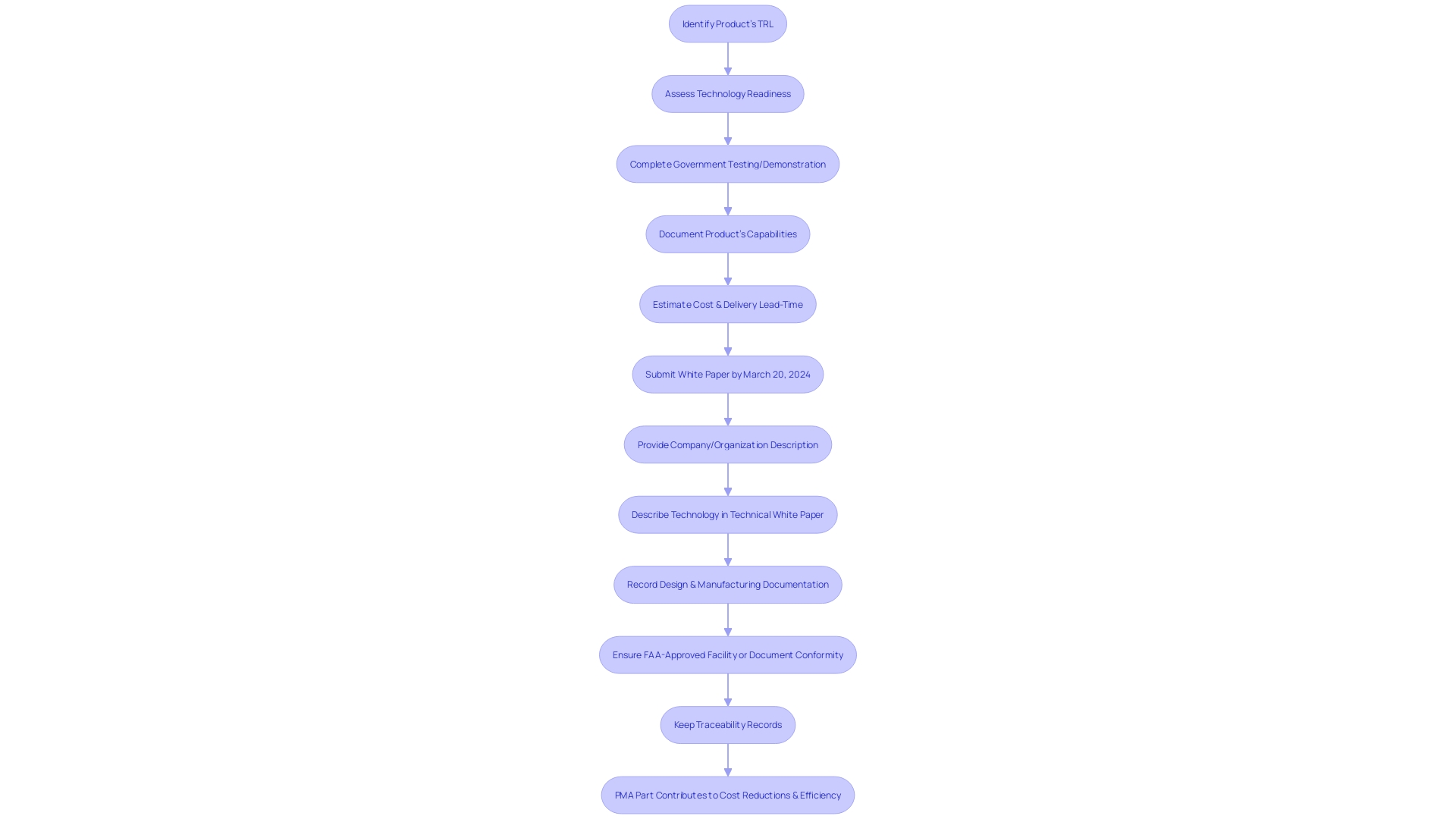
FAA Regulations and PMA
The Federal Aviation Administration (FAA) is actively refining its regulations to adapt to the revolutionary developments in the Advanced Air Mobility (AAM) sector. The updated certification criteria for Light Sports Aircraft (LSA) now encompass aircraft with multiple types of power plants, including all-electric versions. This change particularly supports the certification of eVTOLs as LSAs, reflecting a significant shift towards embracing electric aircraft and their role in reducing traffic congestion and environmental impact.
Moreover, the FAA's modifications to the PMA (Parts Manufacturer Approval) process underscore the importance of safety and innovation in aviation. PMA manufacturers are held to rigorous standards to ensure their parts meet safety requirements. Any alterations in design, materials, or production methods must receive FAA authorization to maintain the integrity of these standards. In light of this, the aviation community is also focusing on mental health considerations within medical certification, as evidenced by the recent summit that united industry experts, mental health professionals, and the FAA to discuss future directions.
The rise of e-commerce and expedited shipping means goods, including dangerous ones, are frequently transported by air. It's crucial for stakeholders in the shipping and e-commerce supply chain to be educated on safe shipping practices. Understanding and complying with hazard classifications, implementing control processes, and adhering to dangerous goods shipping regulations are responsibilities that cannot be overlooked.
As aviation continues to evolve with advancements like the Axe eVTOL, a two-seater aircraft designed to alleviate traffic woes with eco-friendly operations, the FAA's ongoing commitment to addressing aircraft noise is another critical aspect. Their review of the Civil Aircraft Noise Policy, bolstered by over 4,800 public comments, is part of a comprehensive, evidence-based approach to manage noise impacts, reflecting the agency's priority of public safety over expediency. These efforts are all part of the FAA's broader mission to maintain the highest standards of safety while fostering innovation in the aviation industry.
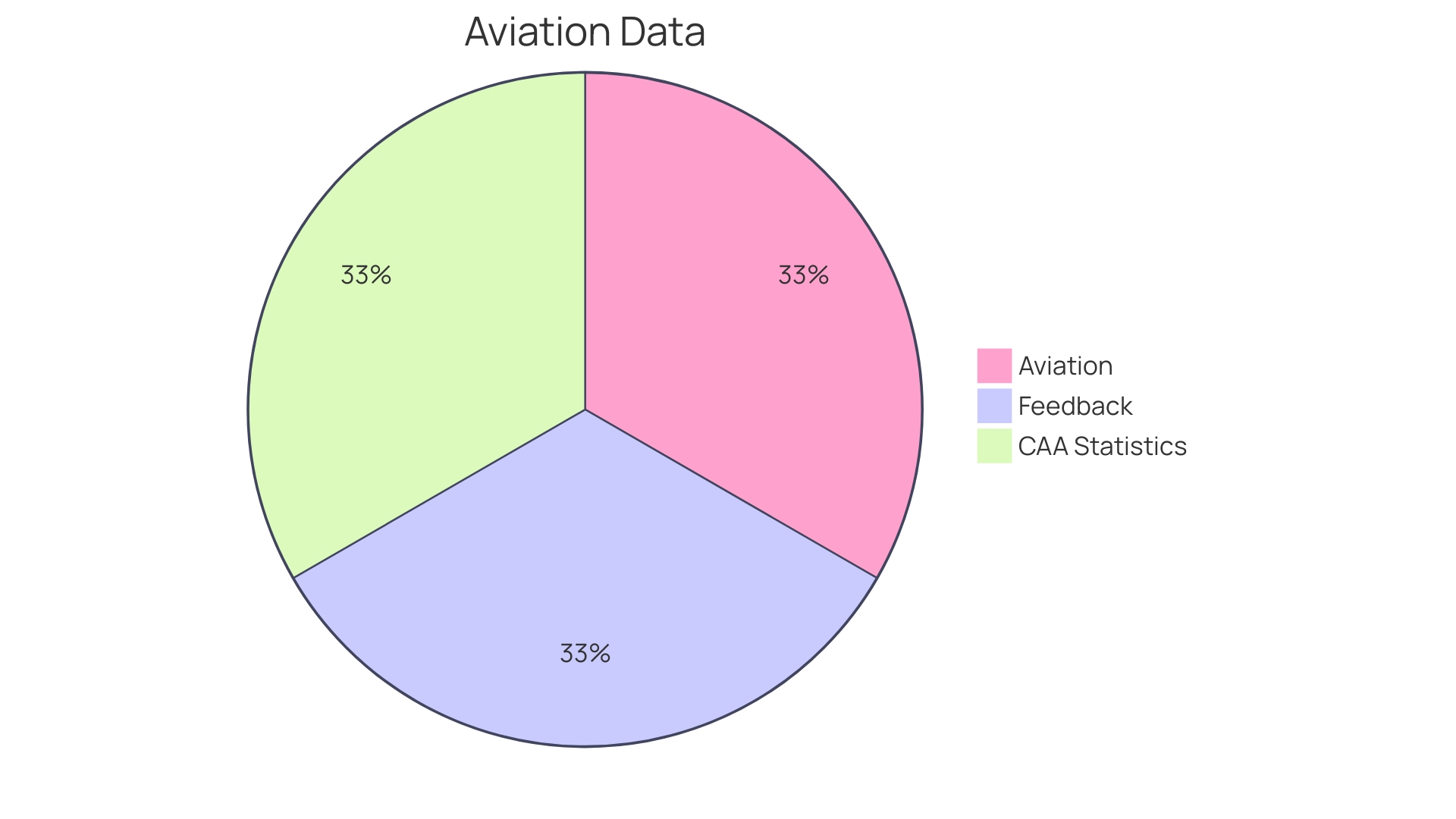
Certification Process for PMA
The intricate process of obtaining Parts Manufacturer Approval (PMA) is crucial for ensuring that aircraft components meet stringent Federal Aviation Administration (FAA) regulations. The journey begins with manufacturers meticulously preparing a comprehensive application, comprising engineering designs, detailed specifications, and extensive test reports for their proposed parts. The FAA then embarks on an exhaustive review, including rigorous inspections and audits of the production facilities, to verify adherence to safety standards and regulatory compliance. Once the FAA is convinced of the parts' quality and compliance, the coveted PMA certification is awarded, signifying the manufacturer's ability to produce and sell these components for aviation use. This certification process underscores the commitment to safety and reliability in the aviation industry, reflecting the meticulous attention to detail required in every aspect of aerospace manufacturing.
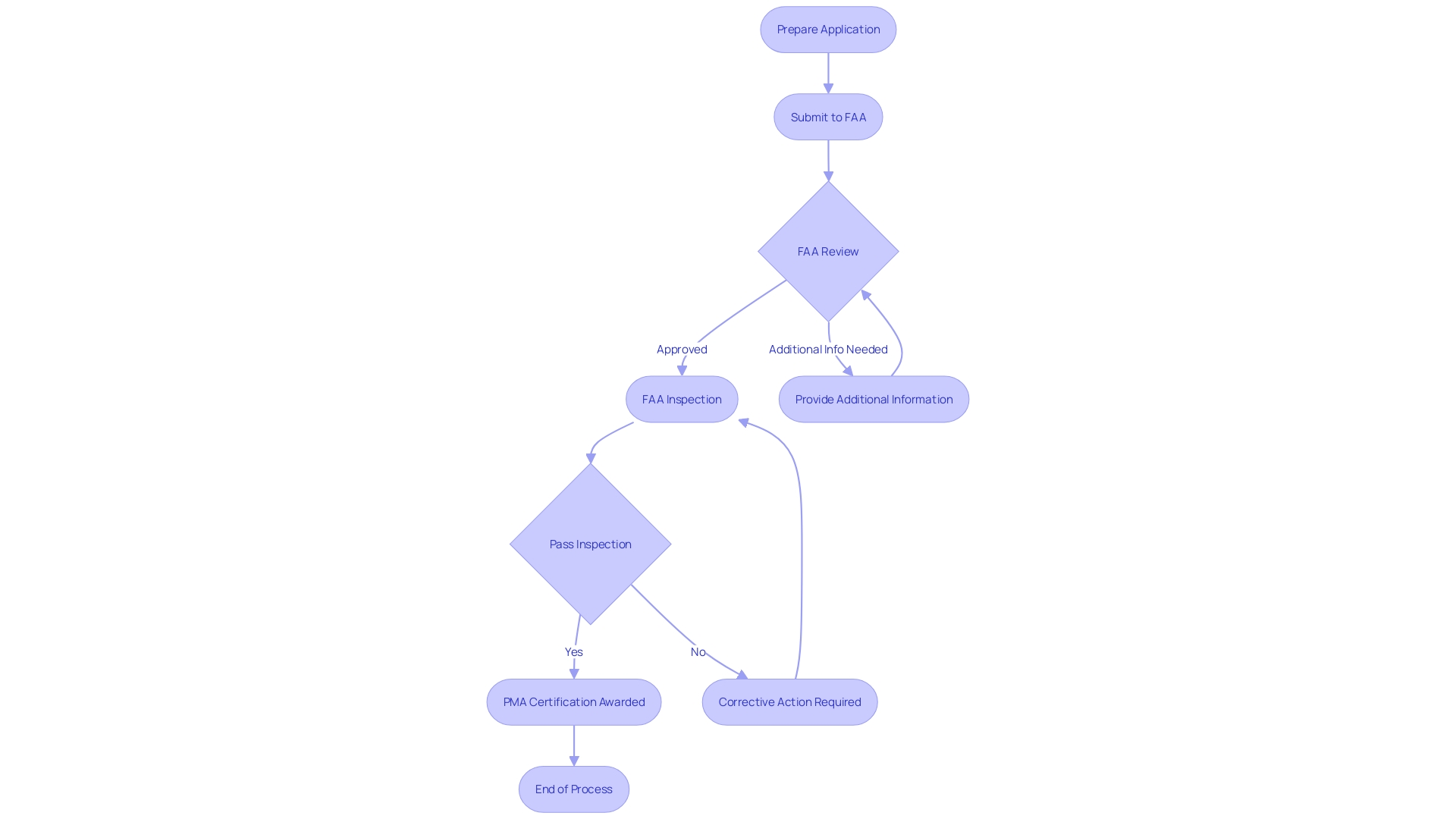
Key Components of a PMA Application
The process of applying for a Parts Manufacturer Approval (PMA) is rigorous and detail-oriented. It necessitates a comprehensive collection of documents to showcase adherence to stringent standards. These documents include, but are not limited to, engineering schematics, specifications for materials used, detailed test results, documentation of the manufacturing procedures, and the protocols for quality assurance. The Federal Aviation Administration (FAA) meticulously examines each aspect to confirm that every part complies with the established safety and performance benchmarks.
Innovation in manufacturing, which is exemplified by companies such as GrayMatter Robotics, has the capability to significantly enhance product quality, showcasing the importance of having robust partners and effective solutions. Their pioneering AI-based robotics are transforming manufacturing procedures, a testament to the progressive nature of today's production environments.
The aviation industry is also deeply committed to environmental sustainability, as evidenced by the U.S. Aviation Climate Action Plan's aim to achieve net-zero greenhouse gas emissions by 2050. A part of this ambitious goal involves the FAA investing over $230 million in developing technologies to reduce fuel consumption, emissions, noise pollution, and furthering research to understand aviation's environmental impacts better.
A pivotal component in maintaining aviation safety is acknowledging the 'human factors'—the interplay between human abilities and the design of equipment and procedures. It is estimated that human performance issues contribute to 70–80% of aviation accidents. A robust safety culture within organizations, therefore, plays a critical role in ensuring safe operations.
Similarly, in the realm of healthcare, the FDA mandates that medical devices, particularly those that are new to the market or pose significant risks, undergo a rigorous pre-market authorization process. The cost of development stages that comply with FDA regulations can represent a significant portion of the total expenses incurred in bringing a product to market, highlighting the critical nature of meeting every regulatory, operational, and performance standard. This is enshrined in the FDA Title 21 Code of Federal Regulations (CFR) Part 820, which outlines the requirements for a traceable and auditable quality management system, as well as current Good Manufacturing Practices (cGMP).
In conclusion, whether it's the meticulous review of manufacturing processes for aviation parts or the stringent regulations governing medical device production, the emphasis is on quality, safety, and compliance. It is the confluence of precise documentation, innovative technology, and a deep-seated culture of safety that paves the way for excellence in the business and healthcare sectors.
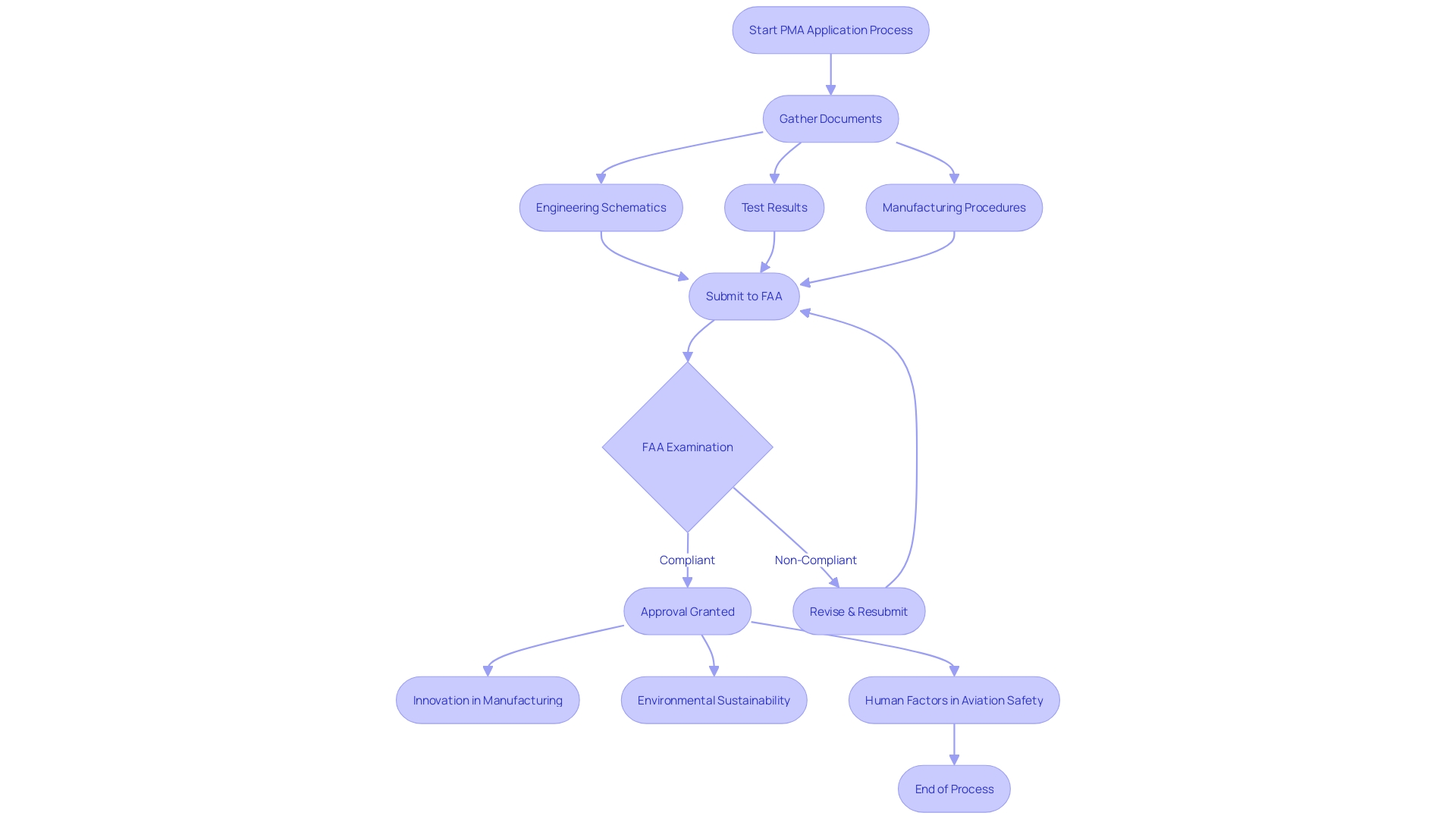
Role of Designated Representatives (DER, DAR) in PMA
The Parts Manufacturer Approval (PMA) certification process is a meticulous and safety-critical procedure that involves multiple stakeholders, including Designated Representatives (DERs) and Designated Airworthiness Representatives (DARs). DERs are professionals appointed by the FAA with the authority to evaluate and endorse engineering data, ensuring it meets stringent FAA standards. DARs, conversely, are sanctioned to inspect aircraft parts and installations for adherence to FAA regulations. Both play instrumental roles in the PMA process by working in tandem with manufacturers to validate that all parts and components not only comply with regulatory requirements but also uphold the highest levels of safety before being released into the market. Their collaboration underscores the importance of delegated design—a system where responsibility for developing design details is assigned, often involving separate contracts to define the scope and criteria of each party's design responsibilities. This intricate network of cooperation and oversight is essential for maintaining the integrity and safety of aircraft components, ultimately contributing to the safe operation of aircraft worldwide.

Compliance Documentation and Submission
The Pre-Market Approval (PMA) process is a rigorous regulatory pathway, and compliance documentation stands as a pivotal requirement for manufacturers. As emphasized by James Williams in FAA Safety Briefing Magazine, understanding the intricacies of the FAA's Compliance Program necessitates a return to the primary sources, as they are the most direct conduits of knowledge. In line with FAA regulations and safety standards, manufacturers are tasked with compiling an exhaustive set of documents that attest to their adherence. This dossier must encompass all pertinent engineering data, the findings of various test reports, meticulous records of quality control measures, and any supplementary information that substantiates compliance. It's the manufacturer's duty to present this assemblage of documentation to the FAA, where it will undergo a thorough review and await approval. The importance of such documentation is underscored by recent FAA activities, including the comprehensive review of Boeing's revised instructions for aircraft maintenance and the meticulous evaluation of public comments on the FAA's Civil Aircraft Noise Policy. These instances exemplify the FAA's unwavering commitment to safety and the meticulousness with which it scrutinizes compliance-related materials. Submissions must be made with great care to avoid the inclusion of confidential information, as public disclosure is part of the process, which is both evidence-based and collaborative in nature. Ultimately, this underscores the critical role of detailed and accurate compliance documentation in ensuring the safety and integrity of the aviation industry.
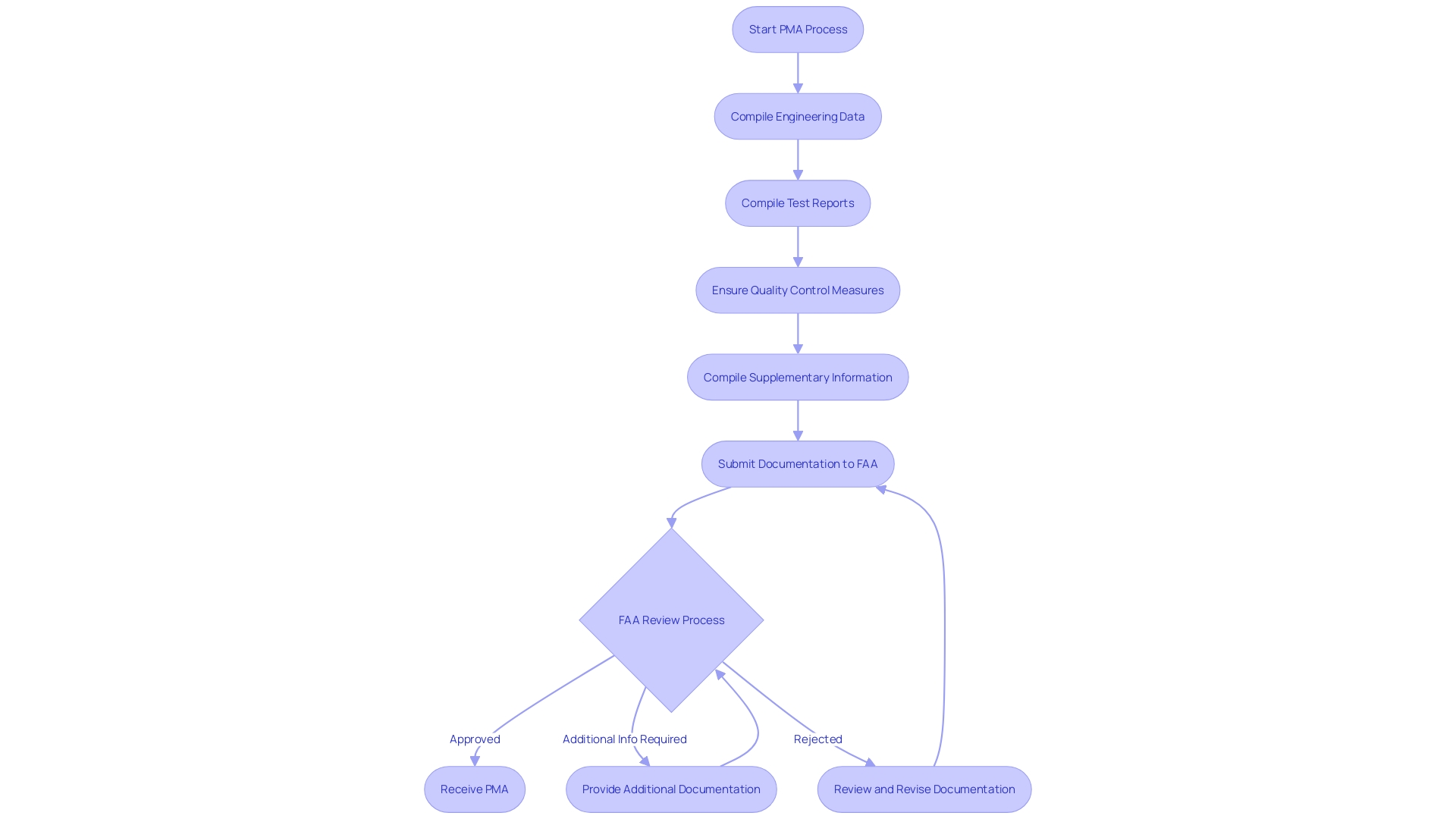
Project Schedule and Milestones for PMA
Achieving PMA certification is a comprehensive process that requires meticulous planning and execution. This journey begins with a clear project initiation stage, where the goals are defined, feasibility is evaluated, and the project's purpose and stakeholders are established. It's not just about setting these parameters but also about understanding and aligning with the motivations and expectations of all parties involved.
The PMA journey is structured around crucial milestones, including the submission of the initial application and navigating through FAA inspections and audits. Any findings or deficiencies must be resolved promptly to maintain momentum towards the final approval. With an industry that's constantly evolving, the introduction of new levels in the MedAccred program, as reported, allows a broader range of companies, including smaller OEMs and contract manufacturers, to participate, ensuring a higher standard of compliance and quality across the board.
Experts in the field, like Chris, a biomedical engineer with 13 years of experience in medical device space, emphasize the importance of a repeatable and efficient delivery of products to meet market demands. This underlines the significance of a well-managed PMA certification process that not only meets the regulatory milestones but also ensures that the product can be consistently delivered to satisfy critical needs in healthcare.
To facilitate a smooth certification trajectory, the project must be carefully monitored and controlled. Tracking progress, identifying deviations, and making necessary adjustments are part of this dynamic phase. Learning from award-winning methodologies, such as the Start from Zero approach highlighted by Chris Barton at a PMI Global Summit, can inspire project managers to think innovatively and overcome barriers in the PMA certification process. Implementing these best practices can be a game-changer, much like the design solutions brought forth by KiiK for Polymermedics' new facility, which demanded a unique approach to their air handling system.
In conclusion, adhering to the project schedule is more than a procedural step; it's about embracing a framework that guides the project to success, ensuring that the medical devices brought to market are not only compliant but also fulfill a crucial need efficiently and effectively.
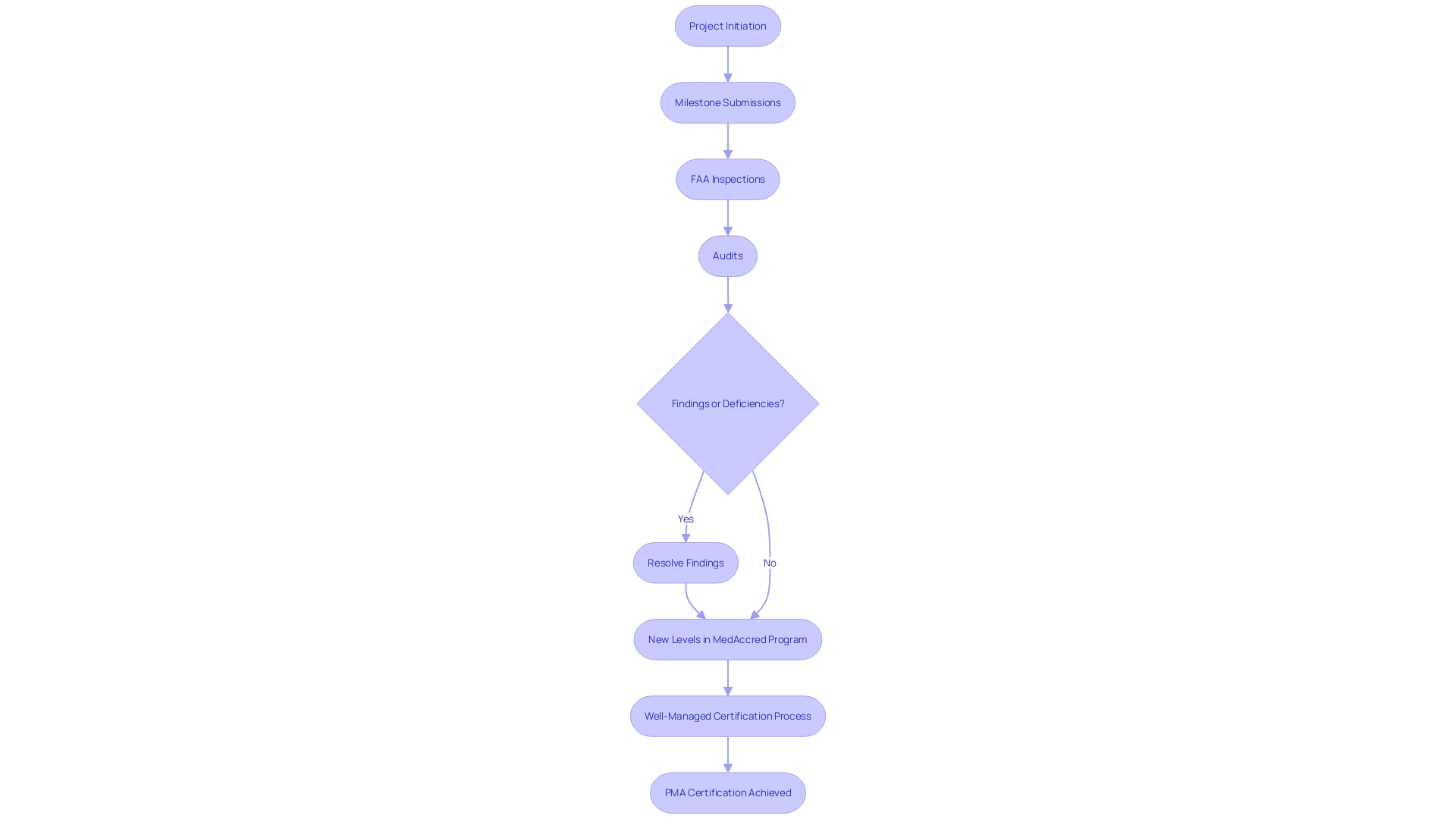
Continued Operational Safety and PMA
Securing PMA certification is merely the beginning of a manufacturer's commitment to safety. With the prestige of certification comes the duty to enforce rigorous quality control measures, perform consistent inspections, and align with FAA regulations. It's essential for manufacturers to meticulously document any changes to PMA components and promptly communicate significant modifications to the FAA, as highlighted by the recent scrutiny over the Boeing 737-9 MAX and the need for revised maintenance instructions. This proactive approach to safety is not just about compliance; it's about safeguarding the reputation of PMA parts for reliability and integrity.
For example, the A380's journey illustrates the significance of adaptability and maintenance in the aviation industry. Despite its advanced technology and initial excitement, the A380 faced challenges due to changing market demands, leading to early termination of production. This underscores the importance of continuous assessment and adaptation of maintenance practices to meet evolving operational needs. Similarly, frame engines in the energy sector demonstrate how life-extension measures are crucial for operational longevity, emphasizing the need for manufacturers to stay vigilant in their maintenance protocols.
The International Air Transport Association (IATA) reported no hull losses or fatal accidents involving passenger jet aircraft in 2023, attesting to the industry's advancement in safety standards. This achievement, with an all accident rate of 0.80 per million sectors, reinforces the importance of diligent maintenance and adherence to safety regulations for manufacturers. By prioritizing operational safety post-PMA certification, manufacturers play a crucial role in maintaining these high standards and contributing to the ongoing safety and reliability of the aviation industry.
Best Practices for Obtaining PMA
Securing a Premarket Approval (PMA) is a rigorous process, and manufacturers embarking on this journey must approach it with precision and strategic planning. Key to this endeavor is an in-depth understanding of FAA regulations, which serve as the foundation for compliance and successful navigation through the PMA pathway. The insights from Chris, a seasoned biomedical engineer with extensive experience in PMA studies, underscore the value of leveraging expertise in this domain. His current role at Greenlight Guru, which involves demonstrating solutions, is reflective of the importance of specialized knowledge in achieving PMA certification.
In order to ensure a successful PMA application, manufacturers should adopt comprehensive documentation practices. These practices are not only crucial for demonstrating compliance but also serve as a central repository for retaining organizational knowledge—an aspect highlighted by the City of Thunder Bay's strategic approach to asset management. This methodology helps to mitigate the risk of losing critical information due to staff turnover, one of the challenges faced in project management.
Furthermore, a robust quality control system is paramount. As reflected in the PMI's 13th edition of its 'Earning Power: Project Management Salary Survey,' professionals holding PMP certification, which signifies a mastery of project management principles, including quality control, report higher median salaries. This correlation between professional certification and earnings potential exemplifies the value that expertise and structured processes bring to a business.
Effective communication with the FAA is also essential. Drawing from the personal experience of mechanics, as mentioned in FAA Safety Briefing Magazine, the use of tools like the Personal Minimums Worksheet aids in maintaining vigilance against complacency—a principle that can be adapted to ensure consistent and clear communication with regulatory bodies.
The success stories and tactics described in these contexts provide a roadmap for manufacturers looking to obtain PMA certification. By integrating these strategies into their PMA application processes, manufacturers can enhance their chances of approval, thereby contributing to the overall safety and reliability of the aviation industry. This is evidenced by the IATA's 2023 Annual Safety Report, which indicates a record low in the all accident rate and highlights the continuous advancements in flight safety, a testament to the industry's commitment to upholding rigorous standards.
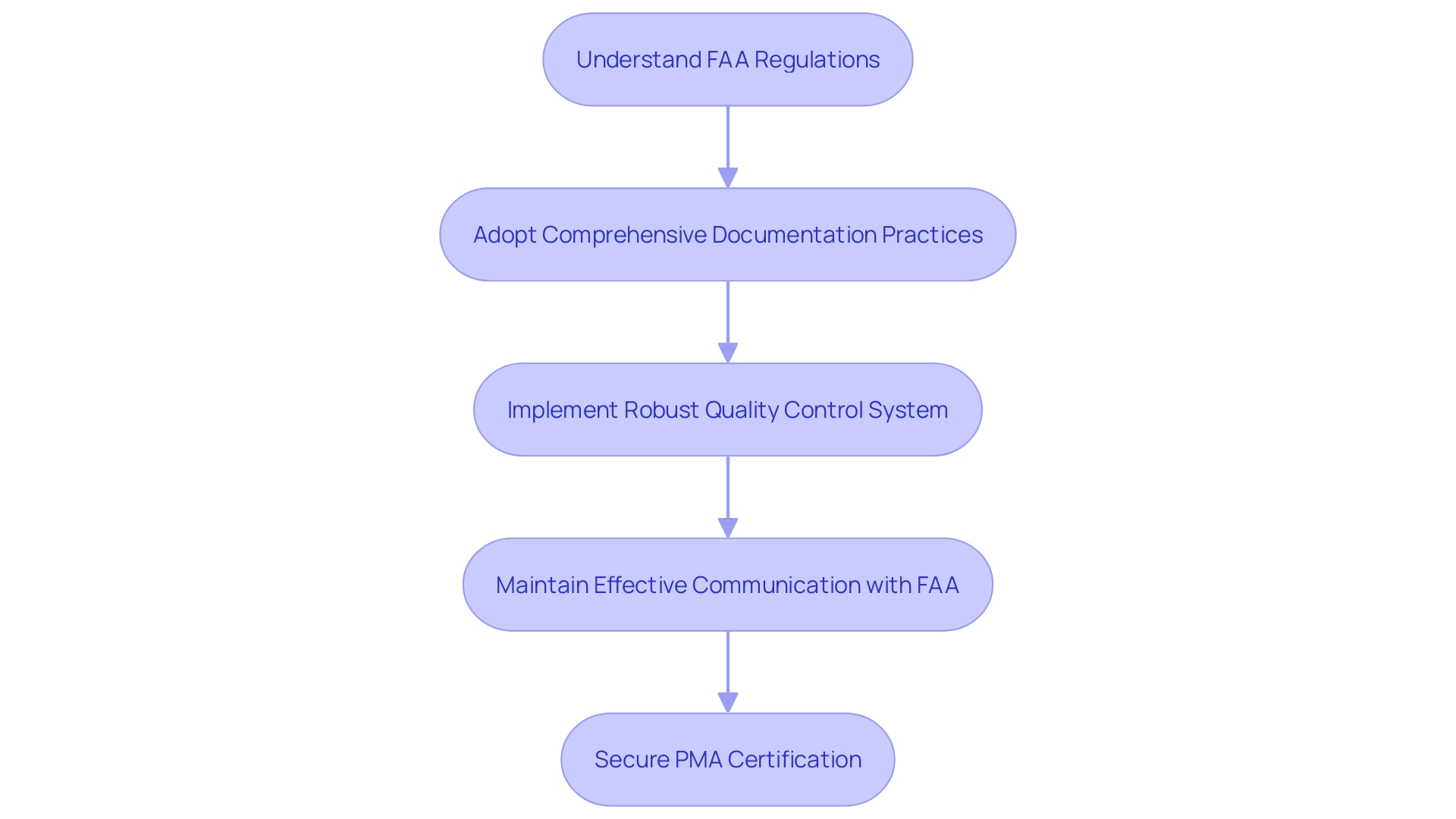
Conclusion
In conclusion, Parts Manufacturer Approval (PMA) is a critical certification process administered by the FAA, allowing third-party manufacturers to produce and sell aircraft replacement components. PMA parts offer cost savings and increased availability, serving as alternatives to OEM parts. PMA's significance extends beyond aviation, with similar certification processes in industries like healthcare.
PMA plays a pivotal role in aviation by introducing cost-effective alternatives to OEM components, enhancing operational efficiency, and contributing to competition. The process involves meticulous preparation of comprehensive applications and rigorous FAA reviews to ensure safety and regulatory compliance.
Designated Representatives (DERs) and Designated Airworthiness Representatives (DARs) play key roles in the PMA process, evaluating engineering data and inspecting parts to ensure compliance. Continued operational safety is essential post-PMA certification, requiring manufacturers to enforce quality control measures and promptly communicate changes to the FAA.
Best practices for obtaining PMA certification include understanding FAA regulations, comprehensive documentation practices, robust quality control systems, and effective communication with the FAA. These practices, along with specialized knowledge and adherence to rigorous standards, contribute to the safety, reliability, and continuous innovation in the aviation industry.
In summary, PMA certification ensures the production and sale of high-quality aircraft replacement components, providing cost savings and increased availability. Adhering to stringent regulations, thorough documentation, and best practices contribute to the safety, reliability, and continuous innovation in the aviation industry.
Discover the cost-saving alternatives to OEM parts with PMA certification.




